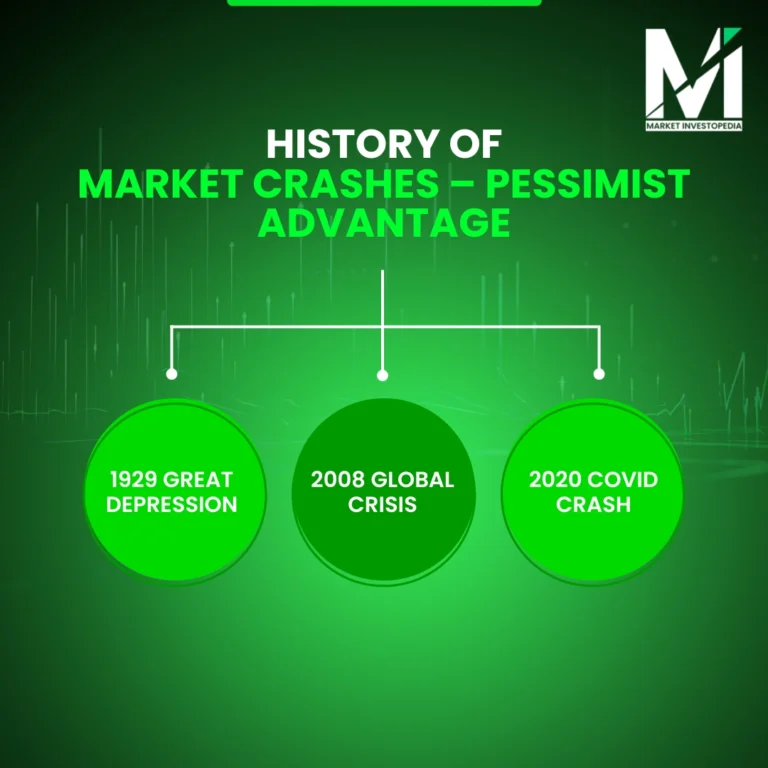Stock Market Pessimist: Risk Aversion or Smart Strategy? A Beginner’s Guide
Not everyone in the trading and investing world views rising prices as a positive indicator. Other investors remain conservative, waiting to see the next fall. This blog will discuss what a stock market pessimist is, how they think, and what they do in the financial markets.
This Market Investopedia guide will teach you the two sides of market behavior—pessimist and optimist—whether you are new to investing or just curious.
What Is a Stock Market Pessimist?
A stock market pessimist is a person who thinks that the market will fall or crash. They tend to anticipate negative news, declining stock prices, and economic issues. They remain cautious or even avoid investing when the market rises instead of getting excited. This is the reverse of an optimist who believes that prices will go up.

This term often appears in puzzles like the stock market pessimist crossword or the stock market pessimist crossword clue, especially in the New York Times. For example, a clue like stock market pessimist NYT usually points to the word bear or skeptic. However, this is not merely a crossword hint but a mindset that affects financial behavior.
Although stock market pessimists might miss out on profits in good times, they are also more prepared for downturns. Their cautious nature prevents them from huge losses in market crashes. Knowing what a pessimist is and why they think this way can help you make better trading decisions.
So, if you have searched stock market pessimist NYT or pessimists crossword clue, now you understand the meaning behind the word.
A quick glance
A pessimist in the stock market is a person who anticipates a decline in the price of stocks. They are conservative and tend to think that the market will have issues or will go down soon.
A bear is a stock market pessimist. Bears anticipate a decline in prices and are wary of investing when the market is falling.
A pessimist in the stock market is an investor who thinks that the market will fall. They do not engage in risky trades and concentrate on money protection in uncertain times.
A pessimist bear is an investor who is very confident that the stock prices will decline. They tend to sell off early or not buy to avoid losses in downturns.
Not always. A lot of 70-year-olds have some money in stocks for growth. It depends on health, income requirements, and how much risk they are willing to take.
Pessimist vs Optimist: Who Wins in Volatile Markets?
The stock market has two categories of investors, pessimists and optimists. A pessimist in the stock market anticipates a decline in the market. They are conservative and tend to shun risky trades. Conversely, an optimist thinks that the market will go up and considers every decline as a buying opportunity.
In stable periods, optimists tend to make more money since they are not afraid to take risks. However, in unstable markets, where prices fluctuate rapidly, pessimists can be the winners. Their cautious nature prevents them from huge losses in case of market crashes.
Look at the 2008 or the COVID-19 crash. Most of the optimistic investors lost a lot of money, and some pessimists who anticipated a decline were more prepared. This is why the two perspectives are significant in trading.
When you are positive all the time, you may overlook risks. Being too negative, you may lose good opportunities. The most successful traders are neither pessimists nor optimists.
When individuals type in words such as pessimist and optimist in the stock market, they are seeking to know how these perceptions influence actual decisions. Understanding the way the two sides think can make you a smarter trader, particularly in uncertain times.
Can a Pessimist Still Profit?
Yes, a pessimist in the stock market can make money, and even more than optimists. Pessimists do not necessarily leap into every advancing stock, but they are concerned with capital preservation and early warning of trouble. This cautious attitude enables them to escape significant losses in case of market crashes.
They tend to buy safe stocks, place stop-loss orders, and keep cash when the market is risky instead of following the hype. There are other hedging techniques that are used by others to earn money when the market drops, like buying gold or shorting stocks.
Well-known investors such as Michael Burry (The Big Short) were pessimists who made massive profits by forecasting market crashes. Their success proves the fact that bearish views, backed by research, may lead to smart trades.
Pessimism does not mean starvation. It is a matter of waiting. The question that many novices pose is, can a pessimist ever succeed in the market? The answer is yes, provided they think carefully and use the right tools.
Thus, optimism is energy in trading, and pessimism is protection. Balanced strategies tend to work best in the long run.

The Balanced Investor: A Mix of Both Worlds
Not every trader is either optimistic or pessimistic. The most intelligent ones understand when to alternate the two. A balanced investor learns on both sides, to act when the time is opportune and to be cautious when the risks are high.
When to Be an Optimist
In good markets, optimism is effective. Confident investors can make high returns when the economy is expanding and the stock prices are increasing. They are long-term investors in companies. Such an attitude can bring huge profits, but only in case the market is favourable.
When to Think Like a Pessimist
It is pessimism that comes in handy during uncertainty, like during market crashes or economic slowdowns. A pessimist in the stock market does not panic buy but concentrates on risk management. This attitude safeguards money when others are blindly rushing in.
Finding the Middle Ground
Good traders do not adhere to a single way of thinking. They monitor the market, read the news, and change their strategy. Being more optimistic or cautious, you have more opportunities to succeed when you combine both.
The pessimist and optimist approaches to trading can guide you to make smarter and more confident decisions, particularly in the current unpredictable market.
Why Is ‘Stock Market Pessimist’ a Popular Crossword Clue?
The term stock market pessimist crossword clue has been one of the most searched terms, particularly by individuals who are solving the New York Times (NYT) crossword and other related puzzles. It is commonly applied in hints such as a Wall Street sceptic or Investor who anticipates a decline.
Something like:
- ear
- Skeptic
- Doubter
All these are associated with bearish thinking, which is a typical theme in finance and investing.
However, the interesting thing is that this financial term has found its way into the common language and entertainment. The first encounter with the term stock market pessimist is not in the trading arena, but in solving word games or reading headlines. This is why such searches as stock market pessimist NYT and pessimist crossword clue are so popular.
This trend indicates the way in which investing terms are entering pop culture. Although a person may not be an active trader, crossword clues assist them in acquiring new financial terms.
Thus, whether you are a puzzle lover or a market watcher, this keyword is a good combination of entertainment and money-making, and that is why it is ranking high in Google searches.
Conclusion
A pessimist in the stock market is not merely a person who anticipates the worst, but he is usually cautious, calculating and concerned about preserving his money. Optimism may result in profits, but pessimism is associated with risk management. The trick is to strike the right balance between the two. As a trader, student, or someone who just wants to know more about this popular crossword and market term, learning both perspectives can enhance your financial choices.

